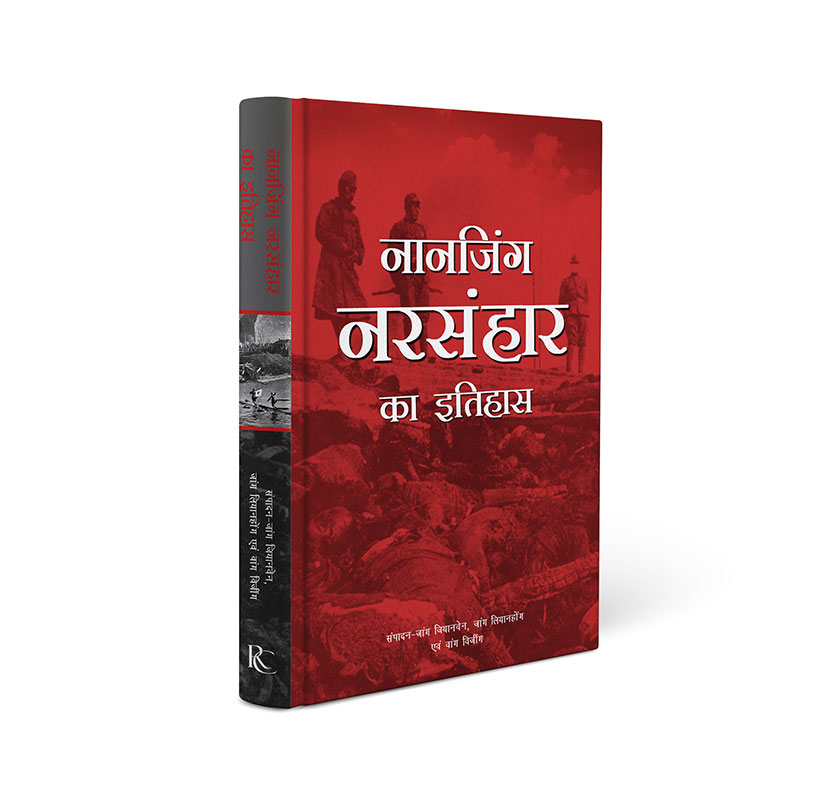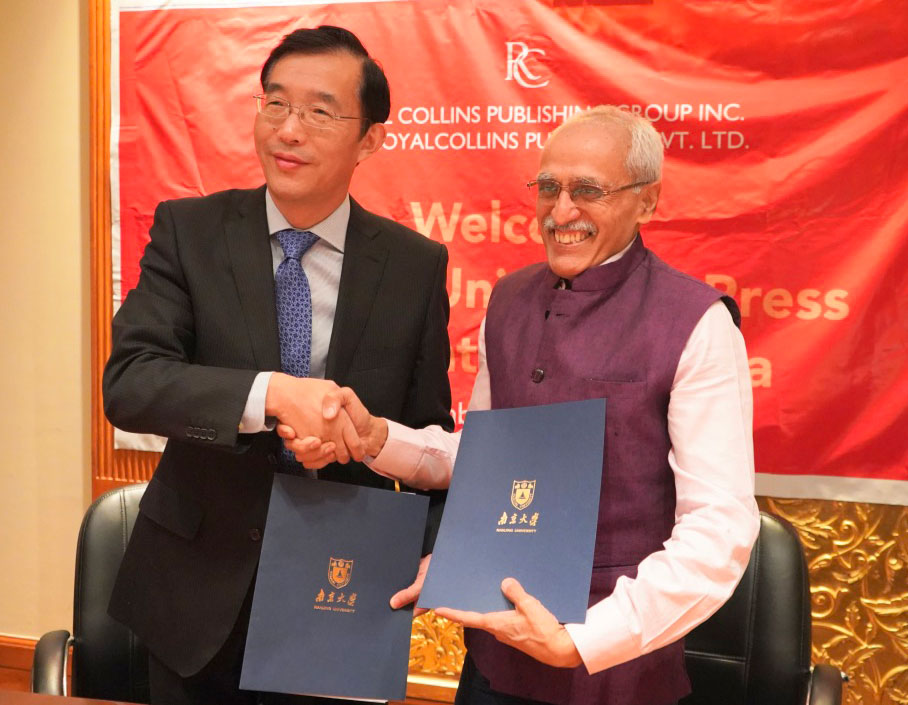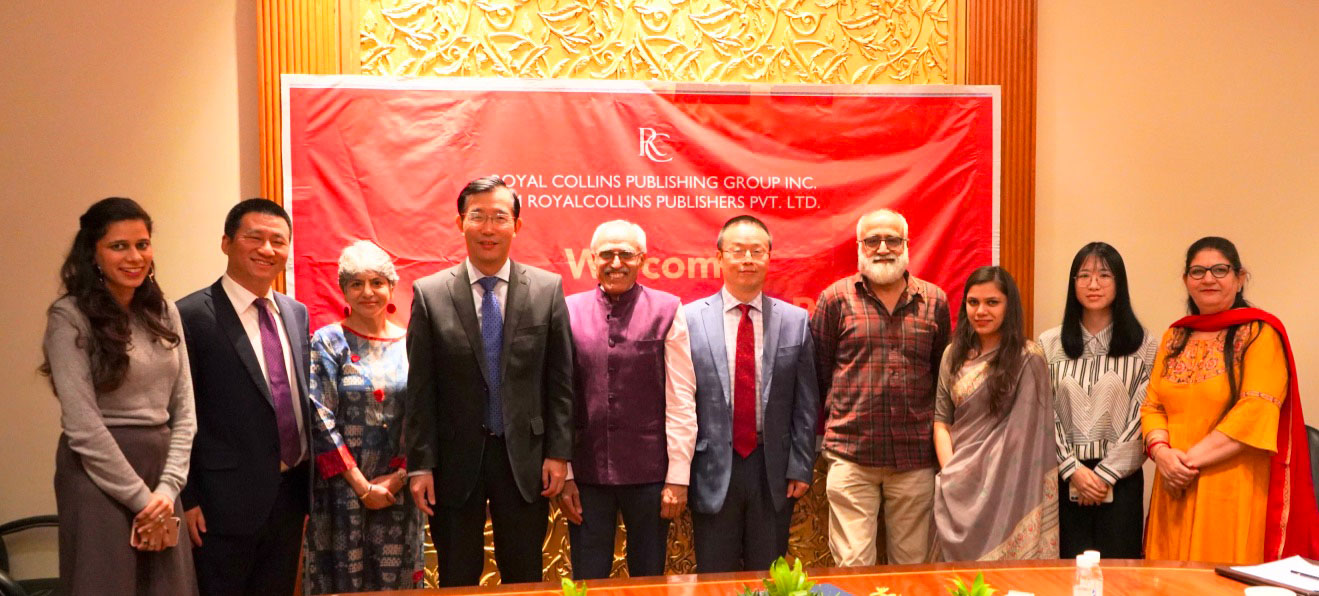Edited by ZHANG XIANWEN, ZHANG LIANHONG and WANG WEIXING
Hindi Translation: PRABHAT RANJAN
Format: Hardcover | Pages: 330pp
Size: 156 × 234 mm
Language: Hindi
Price: $69.95 • ₹4999 • €56.95 • £56.95
ISBN: 978-1-4878-0785-6
[su_button url=”https://www.amazon.com/History-Nanjing-Massacre-Hindi/dp/1487807856/ref=sr_1_94?dchild=1&keywords=Royal+Collins+Publishing+Company&qid=1607504599&sr=8-94″ target=”self” style=”default” background=”#1d71b8″ color=”#FFFFFF” size=”5″ wide=”no” center=”no” radius=”auto” icon=”” icon_color=”#FFFFFF” text_shadow=”none” desc=”” download=”” onclick=”” rel=”” title=”” id=”” class=””]Pre-order on Amazon.com[/su_button]
[arve url=”https://allen1020-1301826455.cos.ap-beijing.myqcloud.com/Mohan_video_202012_2.mp4″ /]
Royal Collins Publishing Group announces that the Hindi Edition of A History of the Nanjing Massacre is globally launched on December 13, 2020. It’s the first Hindi book about Nanjing Massacre and the ceremony is chaired by Mr. Mohan Kalsi, the Chairman of Royal Collins.
The Nanjing Massacre was an episode of mass murder and mass rape committed by Japanese troops against the residents of Nanjing, then the capital of China, during the World War II. The massacre occurred over a period of six weeks starting on December 13, 1937, the day that the Japanese captured Nanjing. During that period, soldiers of the Imperial Japanese Army murdered disarmed combatants and Chinese civilians numbering an estimated over 300,000 and perpetrated widespread rape and looting.
As Mr. Mohan Kalsi’s saying, there are still many people who don’t know Nanjing Massacre and some people who want to deny Nanjing Massacre and try to revise the accounts of the killings after 83 years. This is not right.
The idea of Hindi book was coming from Mr. Mohan’s business visit to Nanjing University Press in 2018. When Mr. Jin Xinrong, the President of Nanjing University Press told Mr. Mohan the sad story of Nanjing Massacre, Mr. Mohan was shocked, “Nanjing is such a beautiful city and it was one of the capital cities in ancient China. How can you imagine 300,000 people were killed during six weeks in 1937? And very few people know this history.” After several months, Mr. Jin and his colleagues were invited to visit India. Two companies had deep and serious discussions and signed the agreement in New Delhi. Royal Collins planned to launch this title on the Memorial Day of Nanjing Massacre in 2020.
Due to COVID-19, the whole work flow was interrupted. But two companies had conquered all difficulties and worked together strongly. Professor Yang Jinrong had made great contribution for the guidance of professional history knowledge in the translation process. Royal Collins team was fully appreciated by his passion, talents and optimism. As the translator, Professor Prabhat Ranjan used pure Hindi to translate this book. As his saying in preface, “There are some books that you read, during whose translation work you also undertake a journey of experience. The book A History of the Nanjing Massacre is one such book which reminds the reader of a terrible crime of civilization.”
[box style=”blue”]About the Book[/box]
The Nanjing Massacre is known as one of the darkest pages in 20th-century world history. For various reasons, however, this historical tragedy remained relatively unknown to the general public in the West until the 1997 publication of Iris Chang’s popular book, The Rape of Nanking: The Forgotten Holocaust of World War II. Since then, the topic has drawn more attention. A History of the Nanjing Massacre is the first comprehensive narrative of the massacre written by a group of Chinese scholars from Nanjing. From the fall of the city, to the atrocities themselves, to the international community’s efforts to save refugees, and finally to the trials of the war criminals, the book offers a complete story of the massacre from the Chinese, Japanese, and Western perspectives. The book is based on a substantial amount of primary source materials collected by a group of Chinese and foreign scholars led by Professor Zhang Xianwen of Nanjing University from major archives and libraries around the world. This massive effort resulted in the publication of 72 volumes of historical data, the most comprehensive collection on the topic.
[box style=”blue”]About the Author[/box]
Mr. Zhang Xianwen, chief editor of Nanjing Massacre Historical Collection, is a professor of the School of History, Nanjing University and honorary President of China Modern History Society.
[box style=”blue”]About Nanjing University Press[/box]
Nanjing University Press Co., Ltd. (NJUP) is a leading comprehensive academic publishing house subordinate to Nanjing University. NJUP was founded in 1984 and is distinctive for its publication of higher education textbooks, academic monographs, and translation of famous foreign academic works as well as original works of traditional Chinese thought and culture.
In recent years, NJUP established partnership and actively deepens collaboration with several overseas publishing organizations. Overseas publication of China’s finest scholarship is another indispensible responsibility of NJUP.
NJUP is also devoted to promoting peace by publishing historical books. The English and Korean editions of A History of the Nanjing Massacre have already been published while the publishing plans of editions in numerous other languages have been confirmed as well. NJUP attempts to raise awareness of the Nanjing Massacre as the “Memory of the World” among foreign readers.
[box style=”blue”]About Royal Collins[/box]
Royal Collins Publishing Group Inc. is a global publisher and distributor that is based in Montreal, Canada. The company started in 2012 as an academic book publisher and since then has grown and transformed into a comprehensive publishing industry services company that offers numerous publishing solutions including print and eBook distribution, print on-demand and digital services.
Committed to the success of its partners, Royal Collins works closely with publishers, retailers, libraries and schools around the world to provide them with the right products and services to help them succeed in the dynamic and increasingly complex world of content publishing.
BKM ROYALCOLLINS PUBLISHERS PVT. LTD. is the Indian branch company of Royal Collins Publishing Group, based in New Delhi. The company has been started by reputed people who have more than three decades of experience in various aspects of publishing and distribution network in South Asia, the Middle East, the North Africa and the Europe market.
[box style=”blue”]Editor’s Note[/box]
On December 13, 1937, the Imperial Japanese Army attacked and captured Nanjing which was then China’s capital. What occurred in the ensuing weeks has put humanity to shame. The Japanese soldiers went through the streets and alleys, indiscriminately killing and torturing hapless Chinese citizens, burning houses, looting the treasures, raping women and young girls, thus soon turning the city to a living hell on earth for the survivors.
The Nanjing Massacre is considered as one of the darkest pages in the twentieth-century world history. The total number of people slaughtered by the Japanese soldiers is estimated to be 300,000. They did not even spare the disarmed combatants, ignoring all the international norms and laws. It was a calculated and planned macabre act of disarming the Chinese soldiers, handcuffing their hands, parading them in the streets, subsequently beheading them, or burying or burning them alive, or firing them with a machine-gun. Just imagine, no means of torture in human imagination was spared! What can possibly be more horrific than this? And, that too in the twentieth century!
It is difficult to believe that all these gruesome rapes and ghastly murders could have been committed without the apparent sanction of the Japanese leaders. Like the Auschwitz massacres, the Nanjing Massacre is also a crime against humanity. The violence and destruction was extensive, despite the efforts of a few Japanese to minimize the scale. These facts have come to light as the relatively large global community residing in Nanjing bore witness to the carnage. It goes to the credit of the international community which not only rescued hundreds of thousands of Chinese citizens but also recorded the unforgettable carnage in the American and European media. Many of them maintained diaries. The accounts of the rape of a large number of young girls and old women by the Japanese soldiers throughout the city are all well documented. The slightest resistance invited brutal death. The mutilated bodies shocked the foreign observers.
Shockingly, the Japanese participating in the Nanjing Massacre provided no rationale for their actions. Later, many controversies were invented, many unfounded theories propounded, claiming that nothing of the kind ever occurred. However, the barbarity displayed by the captors towards their innocent victims has now entered the annals of recent history as one of the most gruesome acts against humanity.
Since ‘history is written by the victor’, this traumatic phase in the history of China never entered the general discourse on war history in the West until the publication of Iris Chang’s popular book, The Rape of Nanking: The Forgotten Holocaust of World War II, in 1997. This eye-opening volume, based on authentic facts in the public domain began drawing more attention after so many decades.
Adding to the growing literature on the Asian holocaust, A History of the Nanjing Massacre is a landmark chapter in recent history which merits global attention. It is a seminal, comprehensive document put together by native Chinese scholars from Nanjing. From the fall of the city, to the atrocities, to the international community’s efforts to save refugees, the book offers a complete story of the massacre. In addition, the text draws substantially upon newly published sources. Drawing on a rich analysis of Chinese, Japanese, and American history textbooks and newspapers, the authors trace the complex understanding of the Nanjing massacre. In the end, the truth always finds ways to prevail!
The translation of this book in Hindi, ‘Nanjing Narsanghar ka Itihas’ is the first attempt by any publisher to make available this ignored chapter in world history to a larger readership. It is our conviction that hitherto unknown history deserves greater cognizance. No surprise then, if the Hindi reader has never heard about the massacre in Nanjing, as this has long been absent from the history of the world. One of the new publications in Hindi from the stable of Royal Collins, it offers the reader a peep into a part of history which has received scant attention by the scholars and historians. This book fills a gap in our knowledge of the brutal crimes of Japanese aggressors against the helpless citizens of Nanjing. One hopes the readers of this volume will reflect on the futility of violence. Also, how a victor/aggressor needs to accept that the life of every individual, of every nation, is sacrosanct.
Krishan Kalsi
Editor-in-Chief
BKM ROYAL COLLINS PUBLISHERS PVT. LTD.
[box style=”blue”]Translator’s Note[/box]
The Nanjing massacre is one of the darkest chapters in history. If I had not translated the book A History of the Nanjing Massacre, I probably would not have known this cruel holocaust of the modern world. But there is no mention of Nanjing massacre in the war history written in the 20th century. Nanjing was the capital of China and the expansionist invading army of Japan not only captured it on December 13, 1937, but committed a sanguinary massacre for six weeks about which there is seldom any mention in history. The plight of America’s nuclear attack on Japan’s cities, Hiroshima and Nagasaki during World War II is remembered by Asia as one of the greatest plagues of the entire world. This has put the narrative of Japan’s atrocity in Nanjing somewhere hidden in the footnotes of history.
It was during the translation of this book that I came to know that before the publication of Iris Chang’s famous book ‘The Rape of Nanjing: The Forgotten Holocaust of World War II’ in 1997, the general public did not know much about this historical tragedy. It means to say that before 1997, most people were unaware of this tragedy of humanity. History has its own politics. Sometimes someone gets prominence, sometimes someone is dismissed, sometimes someone is deposed, but time comes when someone is able to expose the gruesome tragedies after decades. While reading the book, A History of the Nanjing Massacre and translating it, the irony was felt with greater vigor. Today, Japan has a different image as a nation. It is a country which is a follower of peace loving Buddhism, which has faced many natural disasters. One of the most afflicted countries of World War II has produced a compassionate image towards Japan. But reading the history of the Nanjing Massacre, the way in which the details of the violence carried out by the Japanese military are recorded in this book, a different image of Japan emerges which is buried somewhere in history. Japan appears to be an imperialist country, as a country which did not follow the basic principles of war. Reading this book, one realizes that the Japanese army crossed all limits of looting, arson and violence. The way brutal violence has been done to civilians, especially women, they have been raped, tortured, and many times one is overwhelmed with sadness reading the passages related to them in the book. This signifies less of the heroism of the Japanese army, but more of their barbarity – a shameful chapter in history.
To reopen history and bring it under suspicion, many facts have to be collected from many sources, which are authentic. In this book, the authors, researchers have painstakingly gathered the facts that firmly establish how the Japanese army in Nanjing, in the name of searching for the soldiers of China’s defeated army in Nanjing destroyed the remaining citizens, economically and socially. They killed about three hundred thousand innocents on the basis of suspicion, that too in a brutal manner. In this regard, the author has quoted written sources from the members of the international community in Nanjing at the time. Most of them were from the United States, England, Germany, and these people had not only seen the massacre but they acted in the direction of stopping it. They also tried to get the news related to this massacre published in the international media. After the war, there were cases for war crimes, the sources of those cases have also been used in the book. In addition, sources of refugees, even personal sources of officers from the Japanese army, have also been used in the book. Overall, all sources confirm the same point that the Japanese army committed unimaginable cruelty during the occupation of the then capital of China, Nanjing.
While translating it, I felt as if I was traveling to a dark cave of history, which proved to be a journey that surprised, disturbed and upset me. On the one hand, in this book, we have to meet some personalities who had seen the horrors of war and were fortunate to have survived. In their memories, no matter how many diaries, that war still appears in their accounts. On the other hand, this book also appears to point towards the splendor of Nanjing, which the Japanese army plundered for months, but still could not completely erase it.
There are some books that you read, during whose translation work you also undertake a journey of experience. The book ‘History of Nanjing Massacre’ is one such book which reminds the reader of a terrible crime of civilization.
Prabhat Ranjan
Delhi University
[box style=”download”]Click Here to Download Worldwide Press Release A History of the Nanjing Massacre (Hindi Edition)[/box](File 151 KB)



